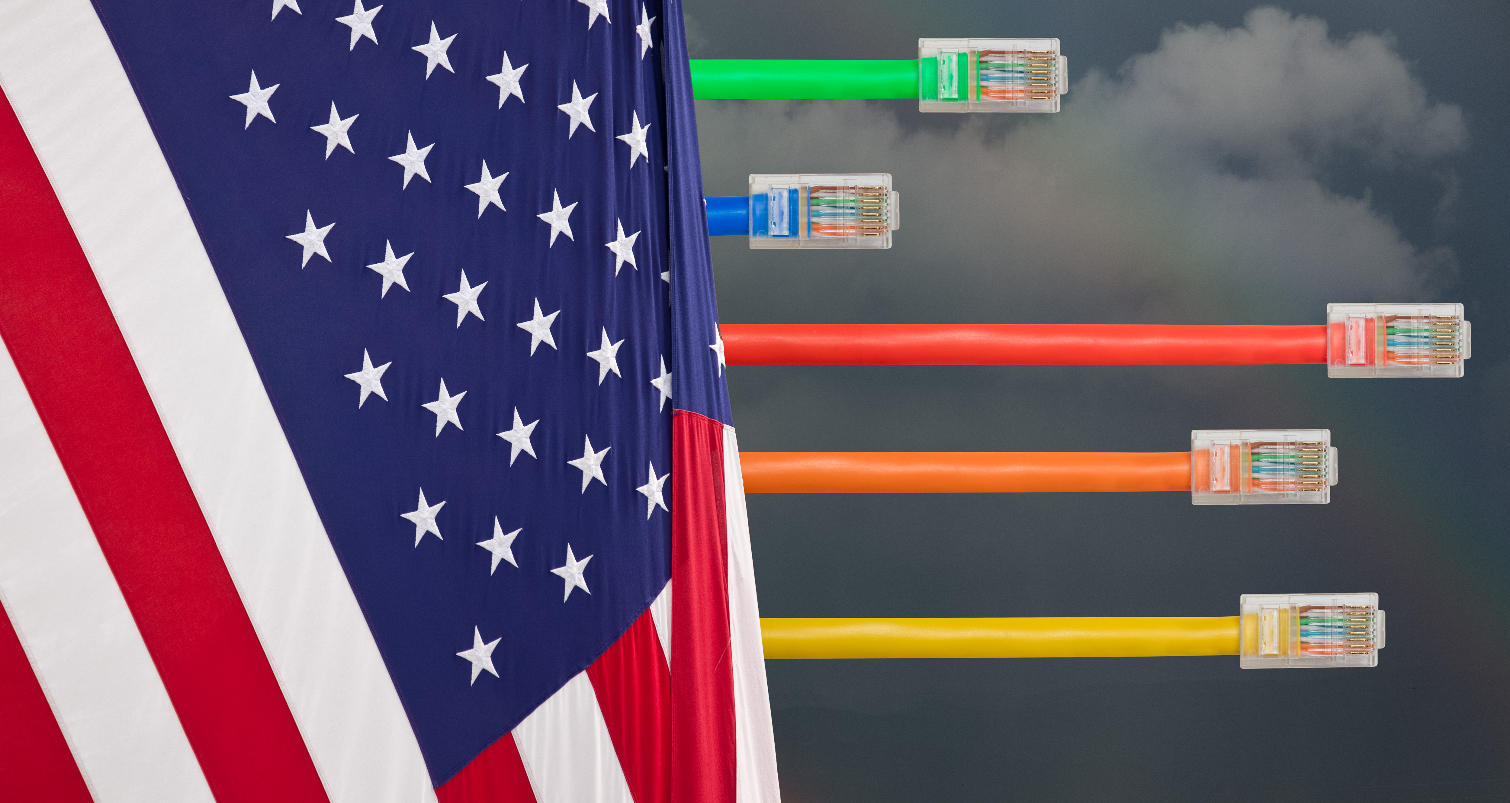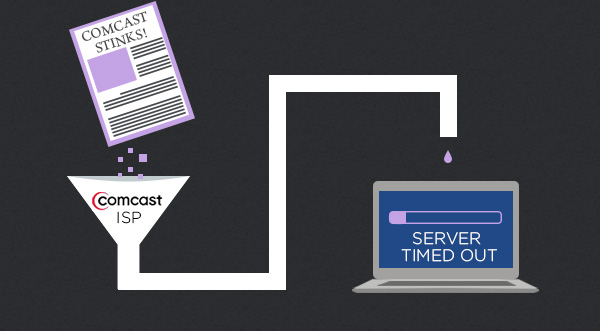5 Freedoms That Just Died With Net Neutrality
Without net neutrality rules, which the FCC just killed, ISPs can obstruct your right to start a business, publish your views or choose which products to buy.
It's all over. Today (Dec. 14), the FCC commissioners voted 3 to 2 to overturn Obama-era net neutrality regulations, which help maintain a free, open Internet. Now, internet service providers will be free to selectively block or slow down content from websites and services they don't like (or that don't pay them). They are only required by law to disclose such blockings or slowings.

Back in 2015, the FCC reclassified broadband ISPs as "common carriers," which placed them in the same category as land-line telephone providers and gave the government agency greater authority to police the activities of ISPs and make sure that broadband ISPs cannot discriminate for or against any type of traffic. The vote today reversed that decision, putting broadband back into the "entertainment" category. It also deliberately weakened the FCC's own regulatory powers, handing enforcement of many of the remaining rules to the FTC.
Consumers are about to be cast in "The Purge: Internet Anarchy," in which a small group of powerful executives decide what you can see, hear and read online. Anti net-neutrality Crusaders such as FCC Chairman Ajit Pai, a former Verizon executive, claim that any kind of regulation stifles innovation. In November, Pai said the 2015 rule changes "depressed investment in building and expanding broadband networks and deterred innovation" and that, under this proposal, "the federal government will stop micromanaging the Internet."
But Pai's argument is operating on dial-up in a 5G world. The real innovation online doesn't come from ISPs, who have been providing consumers with plenty of bandwidth despite net neutrality rules, but from companies that use the internet to deliver information and services. Google and Netflix changed the world because they were able to reach billions of people without paying for an ISP protection racket.
If bandwidth providers start charging your internet-based company an access fee just to have your website appear to their customers, the next Google won't be able to get off the ground. Pai argues that, because ISPs didn't impose pay-to-play policies prior to the 2015 regulations, that they can be counted on to do the right thing now. That's like saying that we should close the local health department and fire all its inspectors since none of the restaurants has been caught spreading salmonella lately.
The real losers here aren't big corporations such as Microsoft or Google or small startups, but end users who will face restrictions on the content and services they can consume. Here are five freedoms that may have died, along with net neutrality.
1. Freedom of the Press

If you wanted to start an international media company 25 years ago, you couldn't do it on your own. The barriers to entry — getting access to a printing press and developing the complex infrastructure to distribute your work — were huge. With the open Internet, however, anyone can start a news site and publish articles or videos without worrying about whether people can read them.
Without net neutrality, ISPs can block or slow down news sites for any reason, be it commercial or ideological. For example, Comcast could block NYTimes.com or slow it to a crawl because the online newspaper published an op-ed in favor of net neutrality or even reported something negative about the company.
Optimum Online, which operates primarily in the New York area, could decide to block your access to the Seattle Post-Intelligencer online because that publication wouldn't pay a fee to be carried. If every ISP charges content providers fees for reaching its customers, many publishers will simply decide that certain markets aren't worth reaching. If you're running a local business in Illinois, you probably wouldn't pay the kickback to have your site appear to users in Texas.
Get instant access to breaking news, the hottest reviews, great deals and helpful tips.
The most important question raised by net neutrality is not "should the government regulate the Internet" but "should a dozen ISPs be allowed to control thousands of other companies?"
The most important question raised by net neutrality is not "should the government regulate the Internet" but "should a dozen ISPs be allowed to control thousands of other companies?"
2. Free and Fair Elections
The large ISPs already have a major influence on politics, with Verizon alone spending $53 million on campaign donations and lobbying between 2010 and 2014. However, without net neutrality, there's nothing to stop the ISPs from influencing elections even more directly. Your broadband provider could block the website of one candidate while speeding up that of another.
An ISP could even censor the sites for political action committees that support a viewpoint or candidate it opposes. Back in 2007, Verizon initially refused to send out text messages from a pro-abortion rights group, but backed down under pressure. What if AT&T decides one day that it opposes capital punishment so much that it blocks prodeathpenalty.com and the site of any gubernatorial candidates that support the practice?
MORE: Net Neutrality Won't Save the Internet. Competition Will
Activists of any stripe should be concerned about their right to publish content that an ISP might disagree with. In 2005, Canadian ISP Telus blocked the site of a labor group that encouraged its workers to strike.
Even more insidiously, ISPs can selectively block government websites that provide voter information such as polling locations and registration forms. If they succeeded in lowering voter turnout in certain areas, that could change the course of an election.
3. Freedom of Association
You always talk to your mom on Skype, but then your ISP signs an exclusive deal to make Google Hangouts its only allowed chat service. Meanwhile, Mom's ISP on the other side of the country serves Hangouts at unusable speeds, but gives Skype its fast lane. This scenario may sound crazy, but without any legal constraint, your ISP has every incentive to swing priority access deals with some messaging services while blocking others.

There's already a precedent for blocking messaging clients in the world of wireless broadband. Back in 2009, AT&T blocked iPhones from making Skype calls on its mobile network, but relented under pressure from the FCC. In 2012, the company also blocked Apple FaceTime on the iPhone.
Of course, you and your mom can always talk on old-fashioned landline phones if you both still have them. Unlike broadband providers, wired phone services are defined as common carriers and are legally obligated to accept calls from anyone. VoIP services such as Vonage are exempt, as are cell phone carriers.
4. Freedom to Start a Business
If you decide to open up a restaurant in town and a street gang demands money not to destroy your place "Last Dragon"-style, you'd call the police. But if your business lives on the Internet, you could have as many as a dozen different ISPs in the U.S. shaking you down and, without net neutrality, no recourse against them.
MORE: How Much Internet Speed Should You Really Pay For?
The most important question raised by net neutrality is not "should the government regulate the Internet" but "should a dozen ISPs be allowed to control thousands of other companies?"
Whether you're trying to start the next Netflix or you're a mommy blogger eking out a living on ad revenue, you could be forced to pay broadband providers in order to reach their customers. If you can't pay, providers could slow your site or service down to the point that nobody wants to use it.
5. Freedom of Choice
You like to do all your shoe shopping at Zappos, but your ISP has an exclusive clothing deal with Walmart, so it slows down Zappos.com so badly that each page takes a minute to load and you get timeout messages when submitting your credit card information. You might be determined enough to keep visiting your favorite online shoe store despite these roadblocks, but most people won't bother.
You've been using Gmail as your primary email address for years, but your ISP decides to slow down that service and speed up Microsoft's Outlook.com instead. How long will you stick with the slow email over the fast one?
In a world where ISPs can slow down or outright block whatever services they like, your freedom to choose everything from your email client to your online university could disappear.
Lead Image Credit: Steve Heap / Shutterstock
-
wiyosaya Here is the page where the FCC has the e-mail address for public comments. I suggest that everyone who is not in favor of the new rules e-mail the FCC about the issue.Reply
http://www.fcc.gov/page/fcc-establishes-new-inbox-open-internet-comments
-
fcabanski Net Neutrality will add regulations, add oversight by numerous agencies which is a massive expansion of government, and will result in higher prices and government taxes/fees.Reply -
awesomedude911 So what can I do? Sure we can have articles explaining why this is a bad thing, but is there any ISP that is for Net NeutralityReply -
milktea Whoever masterminded the bandwidth toggling/favoring at the ISP companies should be deported from Earth.Reply -
jardows Considering in the 20+ years of the Internet, there has been no "Net Neutrality" and everything has worked fine without government regulation.Reply
Also, the thought that "No Net Neutrality" = Loss of rights is very, very, very wrong.
First, it totally skews the idea of rights and freedoms. You may lose certain "freedom" on the Internet, but only on the Internet. In most cases, ISP's are private businesses, not public areas. If a private business, though with a very public presence (think big discount stores or supermarkets) do not want people doing certain actions using their resources, they can block it.
Secondly, the freedoms as described in this article are trivial in impact. Freedom of choice? If I choose to shop at local businesses, so Internet business choices mean nothing to me. Where I live, I can not shop at Macy's or Nordstrom's because neither of those stores are located within 100 miles from me. Does that mean I do not have freedom of choice? According to this article it does. I suppose we should have government regulation that requires a particular store to be conveniently available to everyone in the country regardless of where they live?
I could go on, but you get the point. If you don't get the point, then you need to look past the FUD and go outside where there is fresh air and sunlight, and look at reality.
The best cure for the doomsday prediction of this article is not "Net Neutrality," but an increase in competition for the ISP's. In most cities, the ISP's have agreements with the local governments that give them a government sanctioned monopoly, and competing services can not enter the market. Take that away, give customer's more choices for ISP's, and the market will continue to provide the better services. -
StarBound We have had shaping in our country for years. ADSL was shaped to hell and back. Games that we now play with 200ms international pings used to be in the region of 1.3k ms and up.Reply
What I would like to know is since I am not american how does it affect my rights an ocean away? -
Eruanion Nolaquen Starbound, they can make it worse by throttling the game companies bandwidth. Steam didn't pay us this montyh, sorry, but you get 1 kbs downloadReply -
Eruanion Nolaquen Personally, I'd like to see an article detailing what you need to start a small neighborhood based ISP. A small server (desktop would work) a router or switch, then find out how far to the nearest level 3 trunk line. Fiber is almost as cheap as copper, and you can buy miles of it for <$300. I am thinking doing one where I live, where I need @ 30 miles of fiber would cost me roughly $2k in equipment and lines, plus the cost of placing the lines. Sell access to my neighbors to pay for the costs and the access to level 3's fiber network and I can set my own bandwidth limit, or not.....Reply -
jardows ReplyPersonally, I'd like to see an article detailing what you need to start a small neighborhood based ISP
1. Have like-minded people win a supermajority on the city council. If your town has an elected mayor, best to win that office as well.
2. Pass a city ordinance that allows new companies to come in and install their own Internet infrastructure to compete with the current phone and cable providers (your town most likely has a law that prohibits other companies from doing what you want to do)
